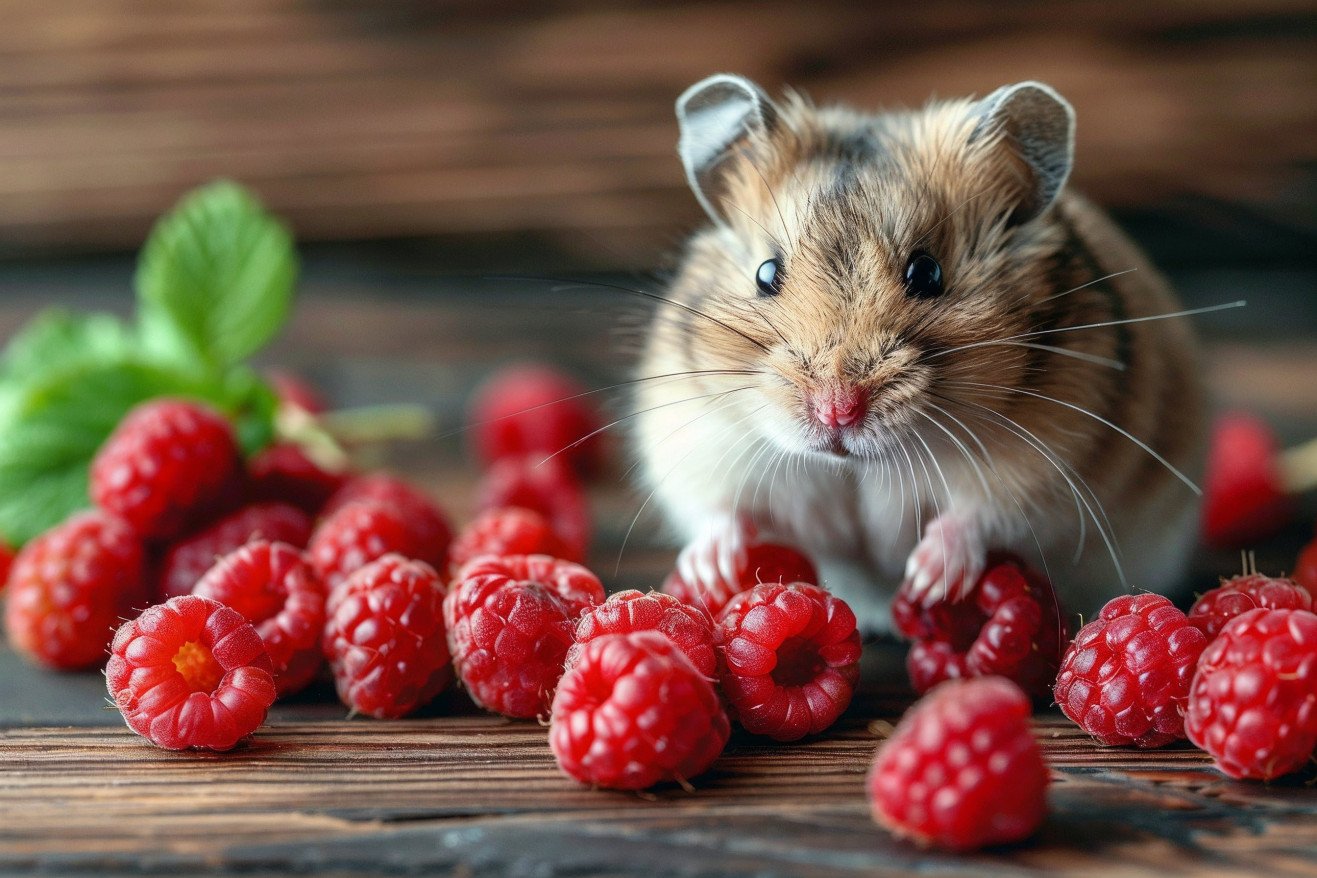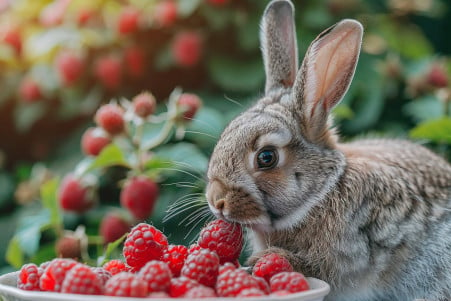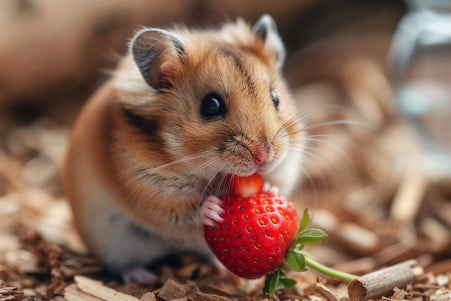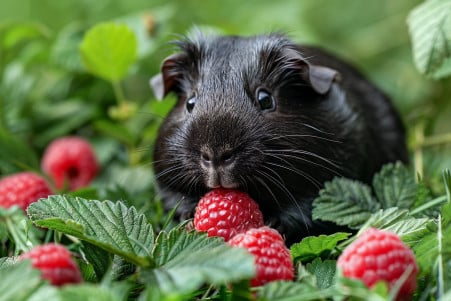Can Hamsters Eat Raspberries? A Vet Weighs In on Safe Berry Consumption
20 April 2024 • Updated 18 April 2024

Are you considering sharing some of the fresh raspberries from your garden with your hamster? While they should only be given as an occasional treat, raspberries can be a nutritious addition to your hamster's diet. When fed in moderation, the vitamins, antioxidants, and fiber in raspberries can be good for hamsters. That said, because they're high in sugar, you should limit the number of raspberries you feed your hamster to a few at a time and only give them to your pet every once in a while.
To help you better understand how to safely incorporate raspberries into your hamster's diet, we've explored the advice of veterinary professionals and the latest animal nutrition research. Covering everything from portion control to potential hazards, this evidence-based overview of what hamsters can and can't eat will help you decide whether or not to let your hamster enjoy this tasty treat.
Can hamsters eat raspberries?
Nutritional Benefits and Risks of Raspberries for Hamsters
There are some important nutrients that can be gained from feeding your hamster raspberries in moderation. Raspberries are a good source of vitamins C and K, as well as the mineral manganese and dietary fiber, per PetMD. The antioxidants in raspberries can also help boost the immune system and reduce inflammation.
That said, raspberries are also high in natural sugars and phosphorus. As We're All About Pets explains, this can lead to obesity, diarrhea, and even life-threatening wet tail in hamsters if they're consumed in excess. This is why it's important to make sure that you're only feeding your hamster raspberries in moderation.
Despite the nutritional benefits that raspberries can provide, Hepper points out that feeding them to your hamster in large quantities can lead to digestive issues, including diarrhea, which can be life-threatening for these small animals. As a result, it's important to make sure that you're limiting the number of raspberries you give your hamster and focusing on feeding them a well-balanced, controlled diet. If you do this, the vitamins and antioxidants in raspberries can make a healthy occasional treat.
How Much and How Often Can Hamsters Have Raspberries?
Because of the high sugar content in raspberries, it’s important to be careful when feeding them to your hamster. We're All About Pets suggests starting with half a raspberry and increasing the amount from there if your hamster doesn’t show any signs of stomach upset.
Hepper says that you should feed your hamster raspberries no more than once or twice a week and never on the same day as other fruits. They also recommend feeding your hamster a portion that’s about 2-3 bites or 1-2 raspberries, depending on the size of your hamster. Feeding your hamster too many raspberries can lead to too much sugar in their diet, which can cause health problems, so it’s important to stick to the recommended portion sizes.
If you follow these guidelines, you should be able to feed your hamster raspberries without worrying about them experiencing any negative side effects. This way, you can ensure that your hamster reaps the nutritional benefits of raspberries without any risk of digestive upset or other issues.
How to Prepare and Serve Raspberries to Your Hamster
Always wash raspberries before serving to remove any pesticides or dirt, as per The Spruce Pets. Raspberries should be cut or broken into small pieces to avoid a choking hazard. Raspberries should be served at room temperature, as cold food can be hard on a hamster's stomach, Pets Food Safety notes.
Any uneaten raspberry should be removed after a few hours to avoid spoilage and illness. Pet Health Network suggests that fresh fruits and vegetables should be fed in small amounts daily. To avoid cross-contamination, raspberries can be served in a separate dish or treat ball.
Following these preparation and serving suggestions will ensure that you can give your hamster an occasional raspberry treat without putting them at risk.
More Healthy Fruits and Veggies for Hamsters
Raspberries are just one of the many fruits and veggies that are safe for hamsters to eat. According to the Hamster Central WIKI, other fruits that are safe for hamsters to eat include apples, pears, bananas, grapes, and most berries. Safe veggies include carrots, broccoli, leafy greens, peas, and peppers. The Spruce Pets also warns that hamsters should not eat citrus fruits, onions, tomato leaves, or raw potatoes.
While it's important to feed your hamster a variety of foods, it's also important to remember to keep portions small and make sure that all fruits and veggies are washed before you give them to your hamster, as recommended by PDSA. By feeding your hamster a variety of fresh fruits and veggies, you can make sure that they have a well-balanced and nutritious diet.
Processed Raspberry Products and Sugary Treats
While fresh raspberries can be a healthy, occasional treat for hamsters, you should steer clear of processed raspberry products like jams and preserves. Pet Assure explains that these products often have added sugars, preservatives, and other ingredients that can be hard for hamsters to digest.
In the same vein, raspberry-flavored commercial treats or cookies can be dangerous because of their high sugar and fat content. The Loved Hamster explains that hamsters should only eat fresh, whole raspberries and avoid processed or sugary raspberry treats.
Because hamsters have sensitive digestive systems, it's best to keep treats to small amounts of fresh fruits and vegetables. Make It Dough points out that even if you make raspberry preserves at home, they can have high sugar content that can cause digestive issues for hamsters. To keep your pet healthy, it's best to keep it simple and give them fresh, whole raspberries in moderation.
Conclusion: Raspberries Are Best in Small Amounts
Raspberries are sweet, soft fruits that are closely related to blackberries. They are packed with essential vitamins and minerals that are great for everyone, including hamsters. In addition, raspberries are low in calories and high in fiber. One cup of raspberries contains 64 calories, 14.7g of carbohydrates, 8g of fiber, 54% of the RDI for Vitamin C, 41% of the RDI for Manganese, and 12% of the RDI for Vitamin K source: Pet Keen.
Raspberries have a number of properties that can help improve your hamster's health. If you feed them in the right amounts, they can be a great way to supplement your hamster's diet. Like other berries, raspberries are high in antioxidants, which are good for your pet. They also have other vitamins and minerals that can help your hamster in a number of ways. However, because raspberries are high in natural sugar, you should be careful not to feed your hamster too many.
That said, raspberries do come with some nutritional concerns and drawbacks. We're All About Pets points out that the higher phosphorus levels in raspberries can lead to imbalances when compared to calcium, and the natural sugars can lead to dental issues if they are consumed in excess. Furthermore, the high water content can lead to diarrhea if your hamster is given too much too quickly.
In general, you should aim to give your hamster a piece of raspberry that's about the size of its head once a week. According to Pets Food Safety, the berries should be soft, at room temperature, and small enough for your hamster to chew. Fresh raspberries are safe and healthy for hamsters in moderation, but avoid raspberry-based products that contain other ingredients.
Proper preparation and safe serving practices are important to avoid potential health problems. Don't forget to mix things up, so make sure to include raspberries as part of a well-rounded diet that includes other fruits and vegetables.


